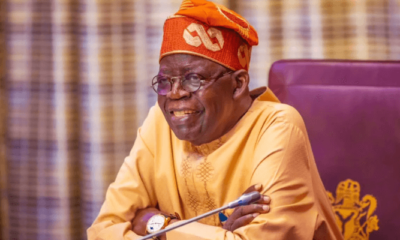Forgotten Dairies
Ilufemiloye: Oba Rashidi Adewolu Ladoja and the Majesty of Ibadan -By Oluwafemi Popoola
The uniqueness of Ibadan transcends culture and politics. This is the city of many firsts. The first television station in Africa. The first university in Nigeria, the first skyscraper in West Africa. It has long been the crucible of Yoruba politics, the headquarters of Western Nigeria, and the seat of daring experimentation in governance and culture. To be an Ibadan man is to carry that boldness in your bones. And as I watched the coronation unfold, I could feel that pride ripple across the crowd.

John Pepper Clark, one of Nigeria’s finest poets and writers, once captured the city of Ibadan in a poem whose relevance endures because of its vivid imagery. Yet, years later, critics still debate his intent: was it an ode of admiration or a subtle rebuke of the city’s sprawling chaos? Clark had lived in Ibadan during his years as a student at the University of Ibadan, and from that experience came the unforgettable line describing the city as “rust and gold scattered among seven hills.” But Ibadan cannot be confined to a single stanza or reduced to a handful of lines.

Ibadan embodies resilience forged over centuries, a culture that refuses to fade, and triumphs deeply woven into its history. And on September 26, 2025, those enduring qualities converged once more, as Ibadan stepped forth not as a relic of the past, but as a living monument of cultural grandeur and historical majesty.
As a true son of Ibadan, I did not merely hear about the coronation of Oba Rashidi Adewolu Ladoja; I lived it. I watched in wonder as people trooped in their thousands toward Mapo Hill, the heartbeat of our city. From Mokola to Beere, from Bodija to Oja’ba, the human tide was unrelenting. Men in flowing agbada, women shimmering in aso oke, and children with excitement shining in their eyes all moved like pilgrims to a sacred ground.
I could hear the drums before I saw them, their deep bass reverberating through my chest. The flutes pierced the air with melodies that seemed to summon our ancestors. And as I stood among the throng, I felt the weight of history pressing gently on my shoulders.
The air itself carried a festive seriousness. I caught the scent of fried akara and roasted corn from roadside sellers mixing with the heavy perfume of newly starched lace. Traders had abandoned their wares to dance. Young men climbed rooftops to catch a glimpse of the spectacle. Elderly women ululated with joy, their voices rising above the drums, testifying that this was no ordinary gathering.
In every face I saw, whether that of a taxi driver in faded ankara, or a business magnate in embroidered agbada—there was pride. Pride that Ibadan was once again the stage on which history was being written.
It was in this river of humanity, with the city’s seven hills watching silently in the background, that Oba Rashidi Adewolu Ladoja ascended the throne as the 44th Olubadan of Ibadanland. And in that moment, I knew J.P. Clark’s Ibadan was not just a poetic vision. It was flesh, blood, and spirit. It was us.
From Mokola to Beere, from Bodija to Oja’ba, the streets of Ibadan throbbed with music, drumming, and dancing. Hundreds of guests and thousands of residents adorned in vibrant aso ebi and rich Yoruba attires converged on Mapo Hall, the symbolic heart of the city, to witness history. Political leaders, businessmen, traditional rulers, and religious figures made the pilgrimage. The President of Nigeria, Bola Ahmed Tinubu, touched down in Ibadan for the ceremony, joined by the Sultan of Sokoto, former governors of the Southwest, and an array of other dignitaries.
The event was colourful and remarkably organized, with cultural displays showcasing the depth of Ibadan’s heritage. Yet, in the middle of all that grandeur, someone thought it wise to hire Alhaji Taye Adebisi, popularly known as Taye Currency, as the guest performer. I remember shaking my head in disbelief. The same Taye Currency whose son happens to be a member of the Oyo State House of Assembly. Trust Nigerians, the internet did not forgive. Social media buzzed, with many Ibadan indigenes wondering aloud how his controversial and often abrasive lyrics, dripping with insults and bravado, qualified him to serenade a coronation of such magnitude. I chuckled at the absurdity. Ibadan has birthed musical icons of grace and depth—voices that could have matched the dignity of the throne. Where were they? Why must we settle for a performer whose artistry belongs more to street carnivals than to royal coronations? But in fairness, not even Taye’s lyrical fireworks could sully the occasion. Ibadan rose above the noise, as it always does, living up to its rich and indomitable history.
The uniqueness of Ibadan transcends culture and politics. This is the city of many firsts. The first television station in Africa. The first university in Nigeria, the first skyscraper in West Africa. It has long been the crucible of Yoruba politics, the headquarters of Western Nigeria, and the seat of daring experimentation in governance and culture. To be an Ibadan man is to carry that boldness in your bones. And as I watched the coronation unfold, I could feel that pride ripple across the crowd.
Oba Ladoja’s journey to the throne has been long and eventful. Born on September 25, 1944, he turned 81 just a day before his coronation. His rise was neither abrupt nor accidental; he climbed the sacred 23 chieftaincy rungs of the Olubadan succession system, a unique and orderly structure that is perhaps the most transparent in Yorubaland.
For over 32 years, Ladoja advanced step by step, bearing titles from Jagun Olubadan to Osi, then Otun Olubadan, before finally ascending as the 44th Olubadan. This system—predictable, seniority-based, and rotational—has long been praised as a model of peaceful traditional succession.
His story, however, is not merely that of a traditional chief. A graduate of Chemical Engineering from the University of Liège in Belgium, fluent in French, and a seasoned businessman, Ladoja built a successful career in oil, gas, and shipping before entering politics. And when he did, he entered with courage.
From 2003 to 2007, he served as the governor of Oyo State, a tenure marked by both reforms and turbulence. I remember those days well. My late father was working as a civil servant in the Oyo State House of Assembly. He admired Ladoja deeply, calling him a man of principle in a time of political compromise. But politics in Ibadan is never without fire. In 2006, when President Olusegun Obasanjo pursued a controversial third term, Ladoja stood firmly against it. That defiance set off a chain reaction. With the machinery of the presidency, the police, and Lamidi Adedibu—the aristocratic strongman of Oyo politics—arrayed against him, Ladoja was impeached. It was less about governance than about power, ambition, and betrayal. He fought, and the courts restored him. That tempest deepened his resilience, but it also showed me, even as a younger man then, how fragile power can be.
And fragility was in the air at the coronation too. Some of the very men who shaped Ladoja’s political story are no longer alive. Lamidi Adedibu is gone. Alao-Akala, his deputy turned rival, has also passed. Former Governor Abiola Ajimobi, whose controversial 2017 chieftaincy review Ladoja successfully challenged in court, is no longer here either. And closest to my heart, my own father, who never stopped admiring Ladoja, was not alive to see this day. That absence cut me deeply.
It reminds me of Achebe’s timeless words in Things Fall Apart: “Living fire begets cold, impotent ash.” Power, fame, and fortune all bow to the transience of life. We are all headed toward the same end. And if that is so, then leaders—political or traditional—must rule with conscience, empathy, and humanity. Leadership without those virtues is a betrayal of the fleeting gift of life.
What made Oba Ladoja’s coronation especially meaningful was not just the grandeur of the ceremony but the love that the people of Ibadan poured out for him. From taxi ranks to clubhouses, from churches to football viewing centers, everywhere I went, people spoke of him with affection. They even gave him a name—Ilufemiloye—“the city wants me on the throne.” There can be no higher endorsement for a monarch than the genuine affection of his people.
As I stood there, watching Kabiyesi take his rightful place, I found myself whispering a prayer. That he wears the crown with dignity, class, and empathy. That he resists the temptations of scandal, sycophancy, and noise that so often cloud traditional thrones today. I have seen how he handled politics—with diplomacy, moderation, and bridge-building. Now, as king, he must embody those virtues even more. If he rules with fairness and compassion, I have no doubt that Ibadan will follow him with loyalty and respect.
The coronation of Oba Rashidi Ladoja was more than an event. It was Ibadan reaffirming its eternal grandeur. Though modernity has dulled the edges of monarchy, the Olubadan remains a symbol of history, tradition, and unity.
As the drums faded and the last fireworks lit up the night sky, I walked away from Mapo with my heart full. For once, politics, history, and tradition had merged into harmony. And there he was—Oba Rashidi Adewolu Ladoja, Ilufemiloye—sitting on the ancient throne of the Olubadan, his aura matching the grandeur of the city itself.
May he reign in wisdom, compassion, and peace. And may we, his people, never forget that power is transient, but dignity, service, and love endure.
Oluwafemi Popoola is a Nigerian journalist, media strategist, and political columnist. He can be reached via bromeo2013@gmail.com








